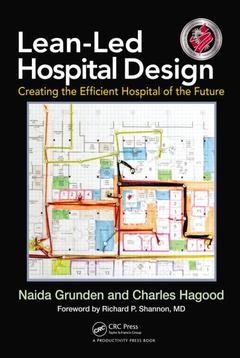Description
Lean-Led Hospital Design
Creating the Efficient Hospital of the Future
Authors: Grunden Naida, Hagood Charles
Language: English
Subjects for Lean-Led Hospital Design:
Keywords
Pr Ep; Prep; Introduction to Lean-led Hospital Design; Cycle Time; Standardization Creates Flexibility; Frontline Healthcare Workers; Learning from the Past to Create Bed Towers of the Future; Vice Versa; St; Patrick Medical Center Emergency Room Transformation; Infection Control Practitioners; The Typical Timeline; Lean Process Improvements; Business Case; Ambulatory Surgery; Seattle Children’s Hospital; Cath Lab; Preadmission Testing; Collaborative Care Model; Lee’s Summit; Takt Time; Bed Tower; Outpatient Surgery; ICU Mortality; Sutter Health; Accountable Care Organizations; BIM Software; Master 3P; Ta Te; St Ep; Master Planning Phase
318 p. · 17.8x25.4 cm · Paperback
Description
/li>Contents
/li>Readership
/li>Biography
/li>
Instead of building new hospitals that import old systems and problems, the time has come to reexamine many of our ideas about what a hospital should be. Can a building foster continuous improvement? How can we design it to be flexible and useful well into the future? How can we do more with less?
Winner of a 2013 Shingo Prize for Operational Excellence!
Answering these questions and more, Lean-Led Hospital Design: Creating the Efficient Hospital of the Future explains how hospitals can be built to increase patient safety and reduce wait times while eliminating waste, lowering costs, and easing some of healthcare?s most persistent problems. It supplies a simplified timeline of architectural planning?from start to finish?to guide readers through the various stages of the Lean design development philosophy, including Lean architectural design and Lean work design. It includes examples from several real healthcare facility design and construction projects, as well as interviews with hospital leaders and architects.
Check out a video of the authors discussing their book, Lean-Led Hospital Design at the 2012 Med Assets Healthcare Business Summit. www.modernhealthcare.com/section/LiveatHBS
Introduction to Lean-led Hospital Design. The Typical Timeline. Are We Too Late? Are We Too Early? Standardization Creates Flexibility. Learning from the Past to Create Bed Towers of the Future. St. Patrick Medical Center Emergency Room Transformation. Integrated Project Delivery and Lean - Can they Work Together? Lean Goes Viral: An Architecture Firm Takes a Second Look. Appendix. Glossary
Naida Grunden is a Lean healthcare consultant and has been a business and technical writer for over 25 years. She speaks and teaches nationally and internationally (Denmark, Cuba) on the application of Toyota-based Lean techniques in healthcare. Her clients include Captain Sullenberger, Pittsburgh Regional Health Initiative, Healthcare Performance Partners, and Global Link.
Grunden is the author of The Pittsburgh Way to Efficient Healthcare published by CRC Press. She was also responsible for launching the PRHI Executive Summary, a monthly newsletter published by the Pittsburgh Regional Health Initiative, when she was Director of Communications. In Grunden received the 2006 Challenge Award from the American College of Clinical Engineering for her article, "Industrial Techniques Help Reduce Hospital-Acquired Infection," in Biomedical Instrumentation and Technology magazine. She has published numerous articles for various healthcare publications and was the keynote speaker for the HIMSS 2010 Conference awards breakfast. Grunden completed her BA in English at California State University, East Bay, and her secondary English teaching credentials at California State University, San Francisco. She lives in Bellingham, Washington, USA.
Charles Hagood, MBA, President and Founder of Healthcare Performance Partners (HPP), has overseen the introduction and implementation of Lean Healthcare systems in numerous healthcare organizations including some of the largest non-profit hospitals, national systems, small critical access hospitals, clinics, and large for-profit systems. HPP is one of the few organizations that have successfully translated Lean manufacturing and the Toyota Production System (TPS) to the healthcare industry. Charles also is a founding Principal of The Access Group, LLC (TAG), which is headquartered in Nashville, Tennessee USA area along with HPP, and has worked with Fortune 100 comp




